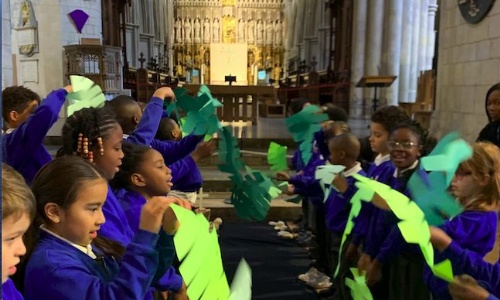Religious Education
Be curious.
Be informed.
Be reflective.
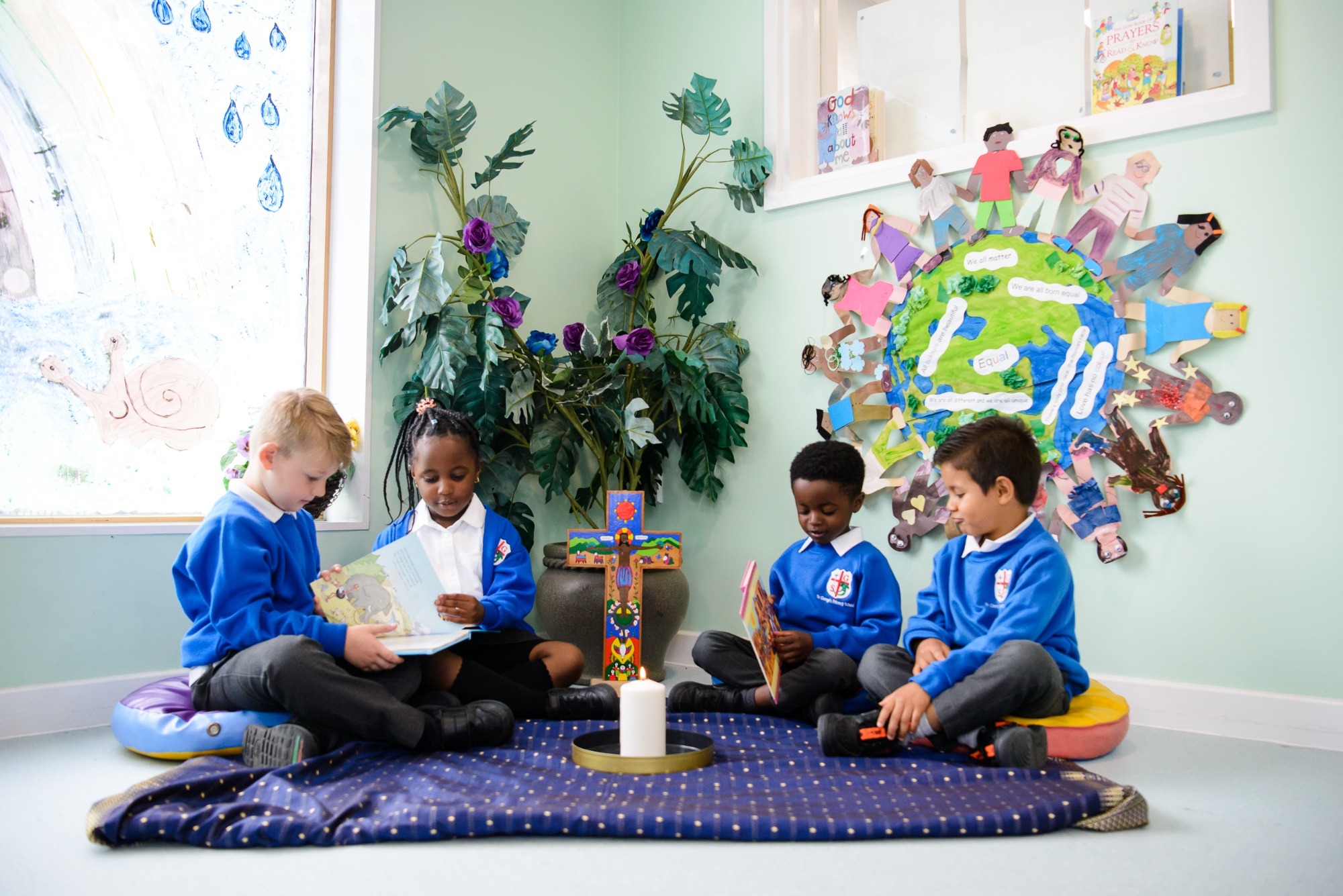
Our Curriculum Vision Statement for Religious Education
Be curious. Be informed. Be reflective.
Intent
Our intent is to deliver Religious Education which reflects the Church of England Statement of Entitlement (2019).
To this end, we use an adapted version of the Southwark Diocesan Board of Education (SDBE) RE Syllabus which:
- Provides clarity over key objectives and vocabulary.
- Raises the profile of AT2 reflections.
- Increases the amount of 'assessable moments'.
The foundation of the Southwark Diocesan Board of Education (SDBE) RE Syllabus ensures our RE curriculum is ‘progressive, sequential, innovative, creative, exciting and engaging, its relevance made clear for all’ SDBE RE policy (2022).
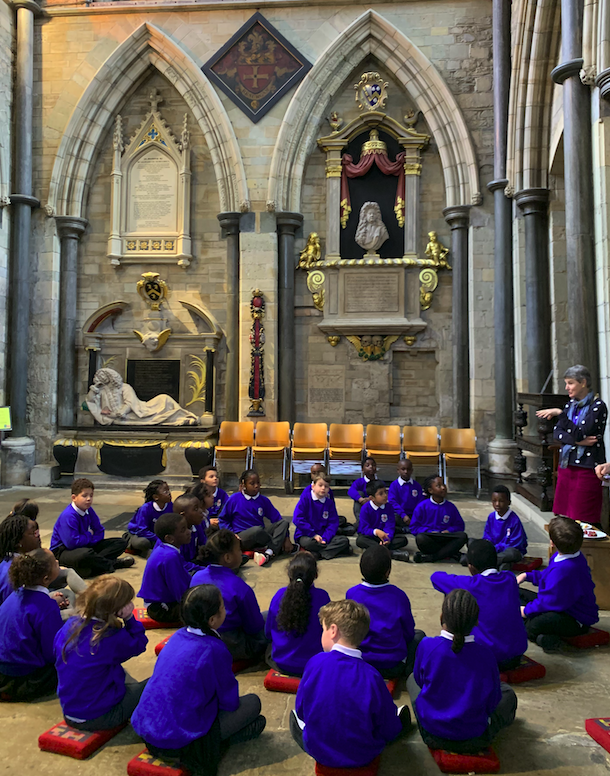
Implementation
All areas of our curriculum are implemented using ten principles of effective instruction outlined in our Teaching Touchstones, which work in symbiosis with the Gradual Release Towards Independence model for teaching.
Coverage:
Religious Education is a core subject at St George's. In line with the Church of England Statement of Entitlement, an hour and a half of dedicated curriculum time is committed to the delivery of RE. The syllabus covers the major world faiths of Christianity, Judaism, Islam, Sikhism and Budhism, with Christianity representing at least 50% of curriculum time.
In the Early Years Foundation Stage, RE learning is integrated within the weekly provision as well as having dedicated carpet time teaching.
The Big Question:
All RE topics are led by a 'big question'. These big questions act as the glue which binds learning across the sessions in that unit. In line with our subject vision for RE, sessions seek to give pupils the space to 'be curious' about aspects of religion; to provide them with powerful knowledge, so that they may 'be informed'; and to provide space to 'be reflective' when pondering the answers to the 'big question'.
AT1 Question:
Attainment Target 1 is for pupils to learn about religion, when pupils are exposed to the more factual aspects of the RE curriculum. Each topic's session has an AT1 question, which is used to facilitate pupils learning the declarative knowledge or facts needed in order to move towards deeper thought for reflection.
AT2 Reflections:
Attainment Target 2 is for pupils to learn from religion. This is where pupils are given the chance to develop the skills of questioning, exploring, reflecting and interpreting human experiences within religion and beliefs. For every session within a unit, there is a planned AT1 question coupled with a deliberately planned AT2 reflective question.
Reflections have been planned to ensure a mixture of personal responses: times when pupils reflect on how what they have learned resonates with their own experiences; and impersonal responses: times when pupils reflect on what meaning may be taken by others from what they have learned. At St George's, AT2 reflections are given the highest of significance.
Vocabulary:
For each topic, we have carefully picked out key vocabulary which needs to be acquired in order for pupils to be able to respond in an 'informed' way. The vocabulary has been separated into two groups.
Key abstract terms are vocabulary which pupils will encounter across RE topics and across Key Stages. They are important concepts which pupils will revisit, each time with a different lens or greater depth.
Tier 3 vocabulary is vocabulary which is specific to that particular unit.
Vocabulary is taught through a variety of mechanisms, in line with our approach to vocabulary across all curriculum areas.
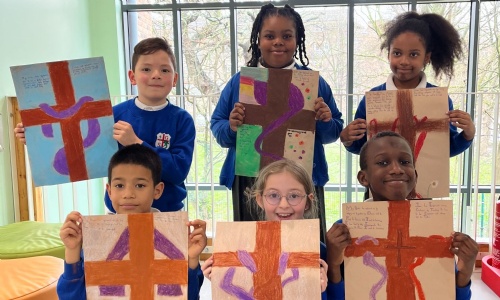
Impact
The impact of our curriculum is directly aligned to our whole school vision and culture statements, the Church of England Statement of Entitlement, and the aims and purposes set out in the St George’s and SDBE RE policies.
We say to our pupils:
Be curious
This means we want our pupils to:
Be brave:
- Ask questions that challenge their own thoughts and viewpoints.
Be great:
- Engage with challenging questions of meaning and purpose.
Be you:
- Seek out opportunities to discover more about others so that they can develop their own faith or viewpoint further.
Be informed
This means we want our pupils to:
Be brave:
- Be informed Courageous Advocates of social justice.
Be great:
- Know about and understand Christianity as a diverse global living faith.
- Gain knowledge and understanding of a range of religions and worldviews.
- Hold balanced and well-informed conversations about religion and belief.
Be you:
- Know how to seek out informed answers to their own questions.
- Know that their viewpoint and cultural capital enriches how informed they are.
Be reflective
This means we want our pupils to:
Be brave:
- Thoughtfully challenge their own viewpoints whilst reflecting on what is important to them.
- Reflect on issues that they may find difficult or challenging.
Be great:
- Make connections between their own life experiences and those of others.
- Articulate their thoughts and reflections from a personal and impersonal perspective.
Be you:
- Explore their own religious, spiritual and philosophical ways of living, believing and thinking.
- Build their own personal faith or viewpoint.
- Develop personal understanding of their own faith, and that of others, by thoughtful, considered, and informed, reflection.
- Be able to use their own faith to make reasoned and informed responses to social issues and life/moral choices.
Assessment
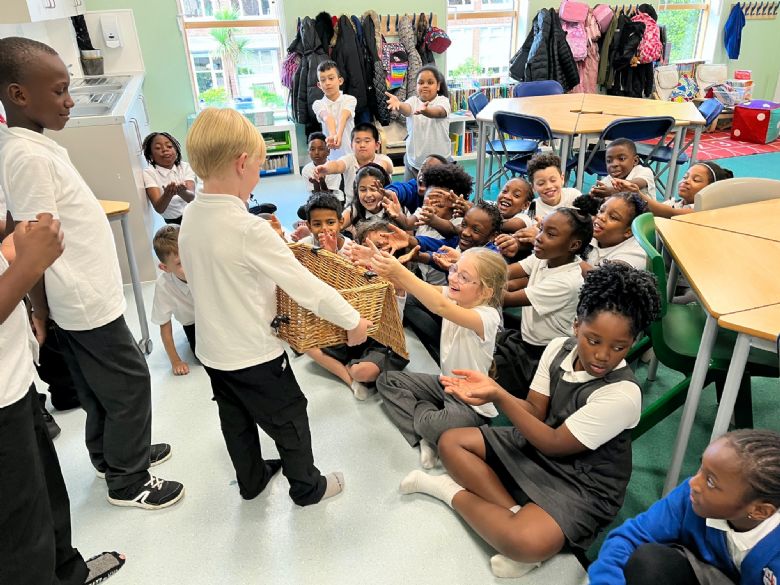
We assess attainment for RE against the St George's Religious Education Progress Model, which has been adapted from the model SDBE attainment target statements.
Each topic has been designed to have a clear focus on one of the three strands from AT1 and from AT2. Those strands are:
| AT1 | AT2 |
|---|---|
| Beliefs, teachings and sources | Identity and belonging |
| Practices and ways of life | Meaning, purpose and truth |
| Forms of expression | Values and commitments |
The progress model can be viewed in full in the attachment at the bottom of this page.
Tasks are designed to draw out pupils' knowledge and understanding under each of these strands.
Teachers use these tasks, alongside their knowledge of the child gleaned from formative assessment, to assess whether a pupil is on track or working towards being on track for three areas: AT1; AT2; and Overall.
Application for RE Gold Mark
This year, St George's are going for gold! Miss Carney, our RE Lead, will be applying for the RE Gold Mark.
Check out our news articles for updates on the process.
For further information on what the RE Gold Mark is, please click here.
Trips
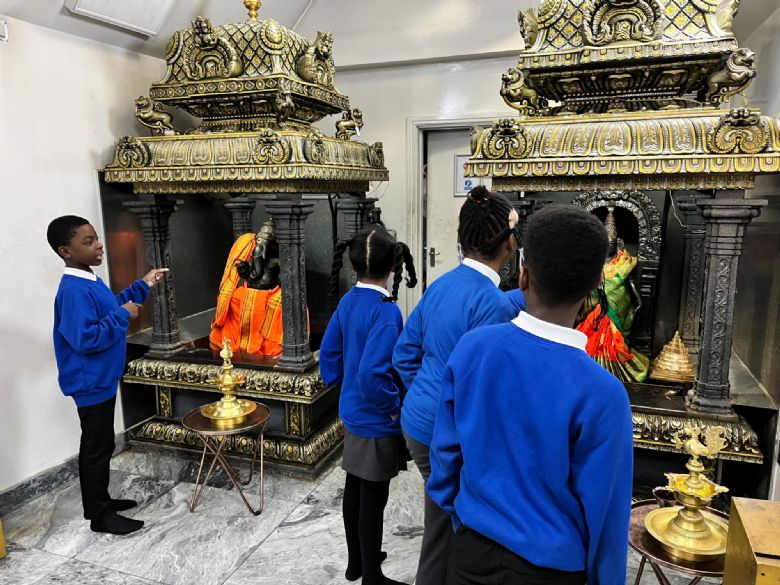
As part of our curriculum offer, we have planned opportunities to visit a variety of places of worship. We take guidance from Lewisham SACRE to ensure places of worship are appropriate for our pupils to visit. We make great use of St George's Church as a learning resource. It is also expected that pupils will visit a place of worship linked to any other world religion they are studying. This helps pupils to make deeper connections with similarities and differences between these important places.

